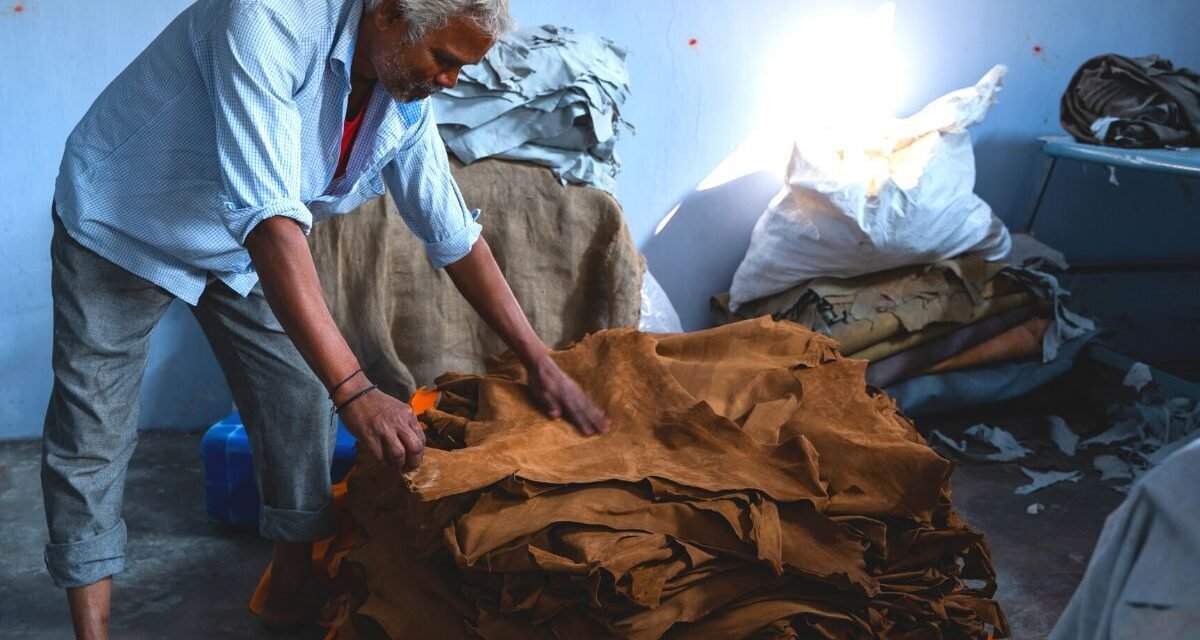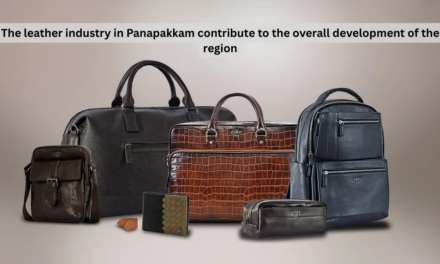Panapakkam’s leather industry plays a pivotal role in contributing to Tamil Nadu’s economy, both in terms of industrial output and employment generation. As part of the broader leather manufacturing cluster in Ranipet District, the region is a significant hub for leather production in India. Here are several key ways in which Panapakkam’s leather industry supports Tamil Nadu’s economic growth:
1. Contribution to the State’s Industrial Output
- Tamil Nadu’s Leather Industry Dominance:
Tamil Nadu is the leading state in India’s leather industry, and Panapakkam, as part of the Ranipet leather cluster, contributes a major share to this dominance. The state accounts for nearly 50% of India’s leather production and over 40% of exports in this sector. - Manufacturing and Production Volume:
Panapakkam produces millions of leather goods annually, including footwear, garments, bags, accessories, and raw leather. These goods form an essential part of the state’s industrial output, contributing significantly to Tamil Nadu’s GDP.
2. Export Revenue
- Leather Exports:
The leather sector in Panapakkam plays a major role in driving Tamil Nadu’s leather exports, which are worth billions of dollars annually. The region exports a wide range of products, including finished leather, footwear, and accessories, contributing significantly to the state’s export earnings.- Export Value: Panapakkam’s leather industry alone contributes to Tamil Nadu’s leather exports, valued at around USD 2 billion annually.
- Global Market Reach: Tamil Nadu’s leather products from Panapakkam are exported to major global markets, including Europe, the United States, and the Middle East, which enhances the state’s position in the global trade network.
3. Employment Generation
- Direct Employment:
The leather industry in Panapakkam provides direct employment to over 100,000 workers, ranging from skilled artisans to factory laborers, skilled technicians, and quality control experts. These workers are crucial for the leather manufacturing process, and the industry remains one of the largest employers in Tamil Nadu. - Indirect Employment:
Panapakkam’s leather industry also creates indirect employment in sectors such as logistics, supply chain management, retail, and raw material sourcing (e.g., hides and skins), thereby supporting the livelihoods of tens of thousands of additional people in the state. - Skill Development:
The leather industry provides significant opportunities for vocational training and skill development through partnerships with institutions like the Leather Sector Skill Council. This creates a skilled workforce that can meet global standards, which in turn helps elevate Tamil Nadu’s overall industrial capacity.
4. Infrastructure Development and Investment
- Industrial Infrastructure:
Panapakkam’s leather sector, particularly through the establishment of the MLFAC Industrial Park, has led to the development of world-class industrial infrastructure. This includes modern factories, common facilities, waste treatment plants, and logistics hubs. The infrastructure development attracts both domestic and foreign investments into the state, further boosting economic growth. - Foreign Direct Investment (FDI):
Tamil Nadu is one of the leading states in attracting FDI into its industrial sectors, and Panapakkam’s leather industry is a major recipient of such investments. The MLFAC Industrial Park is designed to attract foreign investors, fostering global partnerships and increasing access to international markets.
5. Support for Ancillary Industries
- Raw Material Sourcing:
The leather industry in Panapakkam stimulates the growth of related industries such as tanning chemicals, dyeing agents, machinery suppliers, and hardware producers (e.g., zippers, buckles for leather goods). These ancillary industries benefit from the robust demand generated by Panapakkam’s leather production units. - Sustainability and Innovation:
Increasing attention is being paid to eco-friendly and sustainable production methods. Panapakkam’s leather units are adopting green technologies and innovative tanning processes that align with global sustainability trends. These advancements help position Tamil Nadu as a leader in eco-friendly leather production, contributing to the state’s reputation for innovation in industrial manufacturing.
6. Rural Development and Economic Diversification
- Poverty Reduction and Rural Growth:
The leather industry in Panapakkam significantly contributes to rural development by providing employment opportunities in a region that might otherwise have limited industrial options. This helps improve the standard of living for workers and their families, contributing to poverty alleviation and economic diversification in Ranipet District and surrounding areas. - Spillover Effects:
The success of the leather industry creates spillover effects that positively impact other sectors, including retail, hospitality, transportation, and construction. Local businesses benefit from the steady demand for goods and services linked to leather production, which enhances regional economic activity.
7. Tax Revenue and Economic Growth
- Contribution to State Revenue:
The leather industry is a major contributor to Tamil Nadu’s state revenue through taxation (including GST and excise duties) and corporate taxes paid by leather businesses. This revenue is reinvested into state infrastructure, public services, and social welfare programs, which further drives economic growth. - Contribution to GDP:
The leather industry’s substantial output, export earnings, and employment generation significantly contribute to Tamil Nadu’s Gross State Domestic Product (GSDP). The state’s overall economic growth is bolstered by the continued expansion of the leather sector in regions like Panapakkam.
8. Global Brand Recognition for Tamil Nadu
- Reputation as a Global Leather Hub:
Tamil Nadu, with Panapakkam at the heart of its leather production, is recognized as a global leader in the leather industry. The high quality of products manufactured in the region and the industry’s focus on sustainability and innovation contribute to Tamil Nadu’s reputation as a premium leather manufacturing destination, attracting global buyers and further boosting the state’s industrial profile.
Conclusion
Panapakkam’s leather industry significantly contributes to Tamil Nadu’s economy by driving industrial growth, boosting exports, creating employment, and fostering innovation and sustainability. The sector’s output enhances the state’s global trade footprint, while its infrastructure and workforce development support continued economic diversification and regional prosperity. As one of the largest and most important leather manufacturing clusters in India, Panapakkam is a key driver of Tamil Nadu’s industrial success.
Hashtags
#PanapakkamLeatherEconomy #TamilNaduLeatherIndustry #LeatherExportsTN #PanapakkamEconomicImpact #TamilNaduIndustrialGrowth #LeatherManufacturingHub #FootwearIndustryTN #EconomicDevelopmentIndia #PanapakkamContribution #LeatherSectorGrowth







